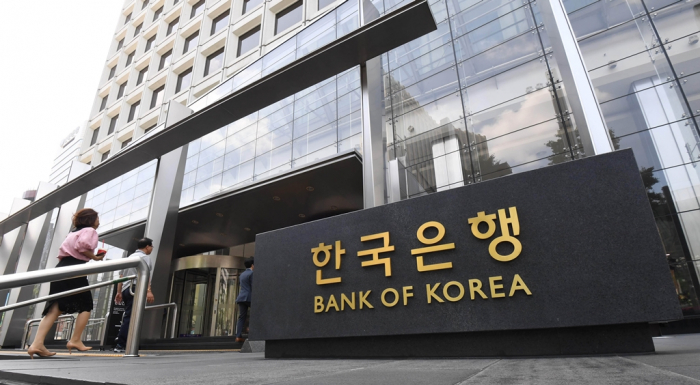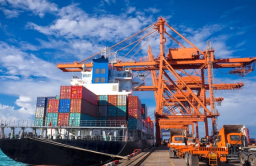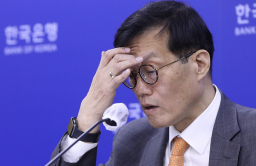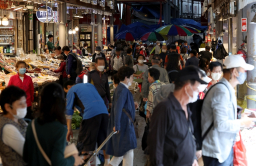-
KOSPI 2577.27 -2.21 -0.09%
-
KOSDAQ 722.52 -7.07 -0.97%
-
KOSPI200 341.49 +0.02 +0.01%
-
USD/KRW 1396 -2.00 0.14%
BOK may raise rates by 50 bps again on Fed, inflation
Central bank
BOK may raise rates by 50 bps again on Fed, inflation
Fed’s 4th 75-bp hike extends US-Korea rate gap to up to 1 percentage point; wider differential will hurt won, add to price pressure
By
Nov 03, 2022 (Gmt+09:00)
2
Min read
News+

South Korea’s central bank may increase interest rates by 50 basis points again as the US Federal Reserve continued to aggressively tighten monetary policy, widening rate differentials between the two countries and putting pressure on the ailing won currency amid sustained inflationary pressure in Asia’s fourth-largest economy.
The Bank of Korea on Thursday indicated it is more likely to raise its policy interest rate by 50 bps in its next meeting on Nov. 24, saying “Fed Chair Jerome Powell’s comments were seen as more hawkish than expected.”
Powell pledged to beat inflation, saying the Fed may have to raise rates more than expected on Wednesday after the central bank delivered a fourth straight 75-bp hike to raise its federal funds rate to 3.75-4.00%, the highest level since January 2008.
“It is worth taking note of Powell’s comments that the Fed’s terminal rate would be higher than previous expectations and it is very premature to discuss a pause in rate hikes. He also said it is easier to correct too much tightening than too little tightening,” said BOK Senior Deputy Governor Lee Seungheon in a meeting to check financial markets after the Fed move.
The BOK took its second big step of a 50-bp rate hike in October, raising the base interest rate to 3.00%.
Analysts had said the central bank may increase rates by only 25 bps this month given growing signs of an economic slowdown. South Korea’s exports fell for the first time in two years in October, posting a trade deficit for seven months in a row.
WIDENING RATE DIFFERENTIALS
The Fed’s latest tightening widened rate gaps between the US and South Korea to up to 1 percentage point. If the US central bank jacks up its policy rate by 50 bps next month as investors forecast, and the BOK raises its by only 25 bps, the differential would be expanded to 1.25 percentage points.
Such differentials are expected to further weigh on the won, the worst-performer among emerging Asian currencies with a 16.5% loss against the dollar so far this year, and spur capital outflows.
A softer won often increases import prices and adds to inflationary pressure in South Korea. Consumer prices grew 5.7% in October from a year earlier, higher than 5.6% in September, with annual core inflation, which excludes volatile food and energy prices, accelerating to 4.8%, the fastest in nearly 14 years, according to government data on Wednesday.
BOK Governor Rhee Chang-yong said last month that the Fed’s policy stance could have an impact on how much the South Korean central bank raises interest rates further.
Analysts in Seoul saw growing chances of BOK’s 50-bp rate hike at its last policy meeting for 2022 later this month.
“It became more important for the BOK to keep pace with global interest rate decisions as the foreign exchange rate in addition to inflation has been having a significant impact on monetary policy since October,” said Kong Dong-rak, a fixed-income analyst at Daishin Securities Co.
“The BOK found more reasons to raise the base rate to 3.5% by year-end,” Kong said.
Write to Mi-Hyun Jo at mwise@hankyung.com
Jongwoo Cheon edited this article.
More To Read
-
Nov 01, 2022 (Gmt+09:00)
-
Oct 12, 2022 (Gmt+09:00)
-
Oct 05, 2022 (Gmt+09:00)





